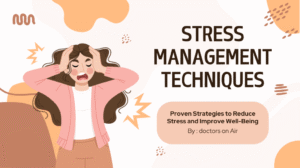What is Stress Management? A Complete Guide to Techniques, Meaning, and Stress-Relieving Foods

Introduction- What is Stress Management ?
Today’s fast-paced world has led to comfort, but so has stress. It’s now an inevitable part of everyday life because of constant deadlines, social pressures, financial burdens and health concerns-making people feel overwhelmed.
Then comes the need for Stress Management. Do you know what stress management is? If not, then you have reached the right blog post. Let’s dive into the read-sharing about stress management, ways to manage stress, techniques to control stress levels among individuals and more.
What is Stress Management?
Typically, stress management involves recognizing the sources of stress in daily life and taking steps or initiatives to reduce its impact. Stress management doesn’t frame ways to eliminate stress but ways to manage it with responses to stressors.
Every individual experiences stress differently; here, what works for one is unfit for another. Therefore, effective measures are put together to empower individuals in ways to manage their stress—leading to happier and healthier lives.
What Do You Mean by Stress Management?
Let us understand what stress management is. It’s for people to handle or manage life’s pressures in a healthier approach. Stress management is essentially about developing emotional resilience, learning to stay calm under pressure, and finding productive solutions. It may include cognitive, behavioural and physical strategies-reducing the impact of stress.
Meaning of Stress Management
Typically, stress management stands for an entire framework of coping techniques to balance life and reduce levels of stress. It comes within strategies based on lifestyle choices and psychological tools. Stress management means-
- Identifying triggers and reasons for stress.
- Understanding the emotional and physical responses to stress.
- Adoption of productive goals to cope with stress effectively.
- Building routines that support physical and mental wellness.
Stress management is about regaining control over your emotions, thoughts, and reactions.
The Importance of Stress Management
That unmanaged stress level has a severe impact on physical and mental health. Have you heard of people with chronic stress—it’s all linked to numerous health issues-
- Anxiety and depression.
- High blood pressure.
- Digestive issues.
- Disturbed sleep pattern/insomnia.
- Weakened immune system.
Practising stress management helps reduce risks and contributes reliably to a better quality of life. It majorly improves the ability to focus, enhance relationships, boost productiveness and support overall health.
What Are the Five Stress Management Techniques?
Although there are countless strategies to manage stress, here are five widely recognized and effective stress management techniques:
Deep Breathing and Meditation
It, of course, was a mindful practice of breathing and meditation that significantly reduced the stress level. This technique helps in calming the mind and body. It even helps manage lower heart rate and regulate breathing.
Physical Activity
Regular exercising is a way to feel relaxed and combat stress. The released endorphins improve mood naturally. Everyday some physical activity supports good sleep and concentration. Health studies say a day with at least 30-minutes of moderate activity is excellent for overall wellness.
Time Management
You must understand the importance of time, so you must know the power of time management. It can lead to a feeling of overwhelm. Prioritizing tasks and setting achievable goals will reduce stress. It even helps to improve work efficiency. To manage time, use planners or digital tools for better day organizing. Try to break larger projects into smaller and manageable tasks. Learn to say no when it’s necessary.
Social Support
Reducing your level of stress-connecting with friends and family is important. It helps in providing emotional support and reduces the feeling of isolation. Build relations stronger—talk about your feelings, join support groups or community organizations. If you need counseling or professional help—don’t hesitate.
Healthy Lifestyle Choices
Lifestyle affects how people manage stress. Adopt techniques-
- Get adequate sleep—aiming for 7-8 hours per night.
- Eat a balanced and healthy diet—choose whole foods over processed options.
- Avoid/quit excessive alcohol, caffeine and nicotine.
Stress Food: The Role of Diet in Stress Management
Diet plays a pivotal role in health and stress. There are particular foods that either help or hinder your ability to manage/cope with stress levels. Some foods are known to reduce stress levels, while others can exacerbate anxiety & fatigue.
Top Stress-Relieving Foods
Dark Chocolate
It’s rich in antioxidants and flavonoids. Eating dark chocolate helps in reducing stress hormones. The small piece of dark chocolate ensures comfort without the sugar crash.
Fatty Fish
To support brain health and reduce inflammation. The anxiety gets reduced with rich sources of omega-3 fatty acids—salmon, mackerel & sardines.
Leafy Greens
Eating dark green leafy vegetables, such as kale, spinach, Swiss chard, and collard greens, is a rich source of magnesium. Thus, it helps regulate cortisol levels and promotes a sense of calmness.
Yogurt and Fermented Foods
Food that supports gut health is closely linked with improved mental health. A healthy gut contributes to better mood and stress regulation.
Nuts and Seeds
To help combat stress, seeds- almonds, walnuts & sunflower seeds are rich sources of vitamins and minerals. The active properties-includes vitamin E and magnesium, help in calming stress.
Herbal Teas
Chamomile, lavender, and green tea offer calming properties to aid relaxation and stress.
Foods to Avoid When Stressed
- Sugary snacks and beverages
- Processed and fast foods
- Excess caffeine
- Alcohol and nicotine
Eating unhealthy foods and junk causes energy crashes. It increases anxiety and disrupts sleep patterns.
Creating a Stress Management Routine
Start with productiveness in behaviour and a consistent daily routine that can lead to a healthier and happier life and reduce stress management.
Morning:
Kickstart with a mindfulness exercise or gratitude journal.
Eat a nutritious breakfast with healthier fats and proteins.
Afternoon:
- Give your body and mind a short break throughout the workday.
- Get some fresh air or walk for a couple of minutes.
Evening to Night:
- Disconnect your digital devices an hour before bed.
- List three positive things that you learned or felt throughout the day.
- Practice relaxation techniques before sleep.
- Eat a healthier yet light dinner.
Stress Management at Work
Stress in professional life or the workplace is common but, of course, manageable. You must try strategies such as
- Prioritizing tasks and setting realistic deadlines.
- Keep your workspace organized and tidy.
- Communicate openly with colleagues and team members.
- Take regular breaks to stretch & breathe work stress.
The Long-Term Benefits of Stress Management
The long-lasting advantages of adopting stress management techniques are-
- Improved physical health.
- Promote mental wellness.
- Stronger relationships.
- Better emotional resilience.
The Final Verdict
Stress is an obvious part of everyday life. Don’t let it control you. If you don’t want to get trapped into anxiousness and depression-important is to understand stress management. Its incorporating effectiveness in routine will help you live a happier and healthier life, grasping challenges in new ways.
From mindful breathing to physical activities, every technique you choose is a holistic approach to well-being. You can eliminate stress, but learning the ways to manage it effectively is what’s precise to understand.
| Home | Vkare | Fuschia | Physiovits | Dr.Snug |


